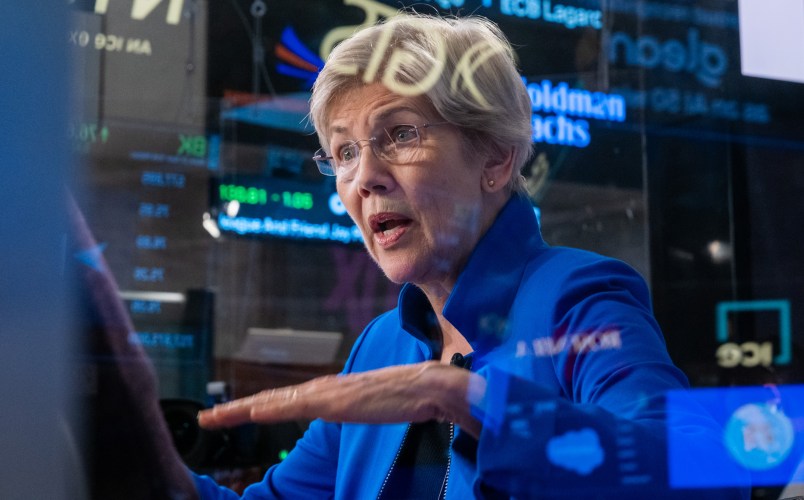The Senate is poised to pass the GENIUS Act in the coming weeks. The bill will bestow upon the crypto industry a long-sought blessing: a key form of the digital currency, stablecoins, will now be subject to a bespoke (and notably light-touch) regulatory system created by Congress. With it will come the U.S. government’s stamp of approval. After years spent being dismissed as a haven for money launderers and speculators, the bill is in part a marker that the crypto industry has arrived in Washington.
And yet, there are a few problems.
The bill could open multiple pathways toward contagion that could spread throughout the financial system, Hill staffers and experts familiar with the legislation warn TPM. Some argue that it would create a financial system that operates with many of the same risks the U.S. left behind in the 20th century, including banks and private companies issuing their own, alternate currencies; others regard the bill as priming the country for a series of runs on digital currencies.
Among legislators, the fighting over the proper level alarm about these possible eventualities has been most acute among Senate Democrats. While nearly the entire Republican Senate conference supports the bill, a few Senate Dems have broken off to lead negotiations over the legislation and persuade others in their party to support it. Sen. Kristen Gillibrand (D-NY) was the first Democrat to co-sponsor the bill; others, including Sens. Ruben Gallego (D-AZ), Mark Warner (D-VA), and Angela Alsobrooks (D-MD), have taken the lead in pushing it.
Stablecoins, the form of crypto that the GENIUS Act addresses, are cryptocurrencies that are pegged to the value of a state-issued currency, like the dollar. Crypto advocates tout stablecoins as solving a few problems: consumers can use their stability to buy other forms of cryptocurrency; they can also, advocates say, double as a means to quickly transfer payments between people. In that sense, they’re kind of like Venmo, only based in the blockchain and, often, possessing perplexing foreign ties. (One of the biggest stablecoins, Tether, is run from El Salvador.)
It’s that quality that causes anxiety among many experts in banking and financial regulation, including Democratic staffers on the Senate Banking Committee. Stablecoins, under the GENIUS Act, will receive the benefits that the U.S. legal system gives to deposits, but without most of the qualities that make that system secure.
“The GENIUS Act folds stablecoins directly into the traditional financial system, while applying weaker safeguards than banks or investment companies must adhere to,” Sen. Elizabeth Warren (D-MA) said in a speech last month.
Financial grease fire
Under the bill, there’s no deposit insurance to guarantee stablecoin holdings. But more troubling than that, for critics, is the limited regulation of how stablecoin issuers can use the money they receive and how, in the event of a crisis, customers would be made whole. New kinds of businesses will be able to issue stablecoins under the legislation, including banks (typically via subsidiaries) and tech megafirms like Meta, X, Amazon, and others.
The risk, experts told TPM, partly stems from how stablecoin issuers would meet a run on their coins. Stablecoins are typically backed up by bank deposits or investments in treasuries; customers pulling their stablecoin deposits at once could resemble an old-school bank run, depleting these assets.
“It would be a financial crisis grease fire,” one Senate staffer told TPM about the possibility.
Under this scenario, even people who don’t hold crypto investments could be affected. A bank that holds a large amount of stablecoin deposits, when faced with mass withdrawals to shore up one or multiple failing stablecoins, could see its balance sheet falter. The same thing could happen if treasury securities or other backing assets are sold en masse, causing prices to plummet.
Mark Hays, who covers cryptocurrency issues for American for Financial Reform, told TPM last month that banks themselves might be exposed in another way. Bank subsidiaries that issue stablecoins could experience a run, meaning that the parent bank would have to bail it out.
These are all means by which risks inherent to the form of cryptocurrency might spread.
“The more banks get exposed to that, the more the fallout could be significant,” Hays said.
Back to the 1800s
Many critics of the GENIUS Act say that features of the bill will revive the problems that America’s financial system experienced in the 19th century.
There’s an irony here. Some of Trump II’s staunchest backers, particularly those on the new tech right, frame their support for the president as part of an effort to return to the 1890s. Trump himself has supposedly become enamored with President William McKinley; some supporters speak about going further than undoing the social changes of the 1960s or the New Deal, and instead call to undo the changes brought by the Progressive Era. That includes the federal reserve, income tax, and many early banking regulations.
Of course, in the case of cryptocurrency, this effort to turn back the clock skips right past a key point of the push for legislation. The GENIUS Act, some observers say, could prompt mass adoption of the coins. That, in the event of a crisis, could prompt the Federal Reserve to bail out issuers — a decidedly post-1890s backstop.
But one feature of the bill would turn time back: it would allow banks and some businesses to issue their own stablecoins.
This hasn’t escaped the attention of analysts at JP Morgan; strategists at the bank reportedly noted in a letter to clients that such a system would recall that of “the 19th century, when various types of banknotes were valued differently.”
For big tech firms, stablecoins present an opportunity: users could pay for purchases entirely within an app. Companies with operations around the world could unify transactions under one, in-house coin; they could also charge small transaction fees on each purchase that would open up a new way of making money.
Hilary Allen, an American University professor who studies financial regulation, told TPM that the problem, again, would be that these are not actual bank deposits: they are lightly regulated cryptocurrencies.
“People will quite happily leave all their money in an app offered by a big tech platform,” she said.
The scale of the risk to the financial system all depends on how many people adopt the use of stablecoins. Relatively few people use cryptocurrencies, though industry boosters argue that passing the GENIUS Act and market structure legislation later this summer will spur more people to do so. Big tech firms issuing their own coins as a means to buy products sold by the firms would also prompt more people to join. But even that, Allen said, could raise troubling questions about how it affects the nature of these businesses.
“Do they become too-big-to-fail financial institutions with all the power and the implicit bailouts that come with that?”
Source link











